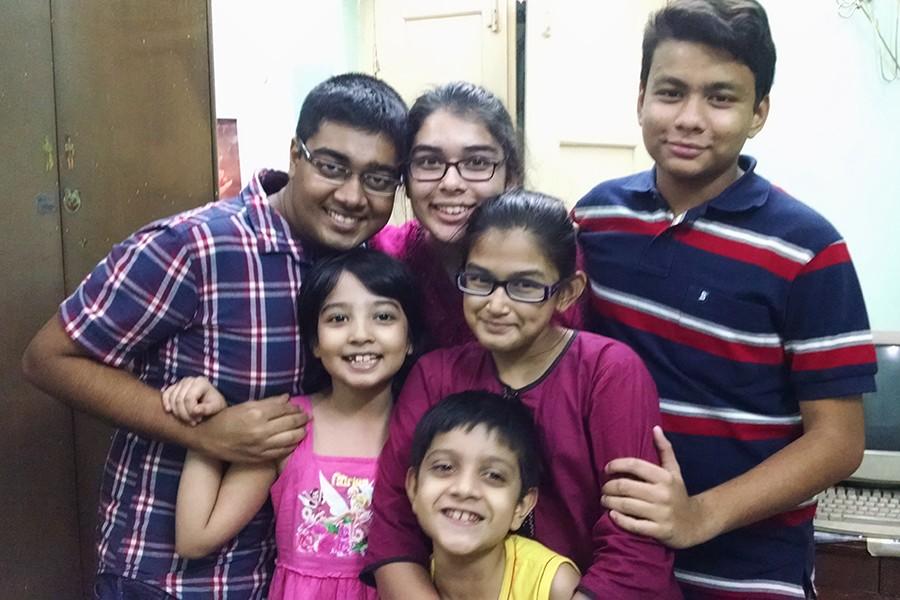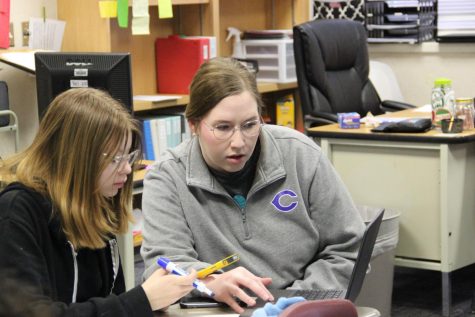Junior blends Indian culture with life in America
Junior Monica Ghosh (top center) with family members.
She peered out the small window to catch a last glimpse of home. As the distance between the grassy plains and the height of the airplane increased, worries began to dwindle and comfort took their place. With relief she felt a sense of disconnect. Her mind filled with images of the Kolkata airport, smiling faces and childish squeals of excitement. These were the memories of coming home to a world away.
Junior Monica Ghosh spent much of her life in India, the birthplace of her parents. Coming from a multicultural background, she is fluent in multiple languages and has traveled across Asia.
“I know Hindi, Bengali, English, a little bit of Arabic, Urdu and Gujarati,” Ghosh said. “I’m not fluent in French, but I can speak it to where I can hold basic conversations, and I’m learning ASL. At home I speak Bengali because it’s what I first learned, and in public I speak English. Bengali is the main language I think in.”
Ghosh has travelled to Thailand, China, Laos, Germany, England, Canada and Mexico but has spent the most time in India.
“Almost every summer, I’ve visited India, unless my grandparents came here,” Ghosh said. “All of my family except an aunt lives there. It’s like a second home to me.”
I can understand what it’s like to be outside of a culture, a certain community and society.
— Monica Ghosh
Ghosh said her annual visits across Asia have taught her how to incorporate both cultures into her life.
“Western culture has provided a basis to work in a sense of both interdependence as well as independence,” Ghosh said. “Eastern culture has provided an understanding of the hardships of a third world country and things such as depending on natural resources. In all, both cultures help me understand everything as a whole.”
Ghosh said incorporating both cultures gives her a new perspective.
“I’m open about things and considerate of situations of others,” Ghosh said. “I personally think that since I’ve dealt with so many different people and so many different cultures, I can easily understand them better. I can understand what it’s like to be outside of a culture, a certain community and society.”
Because Ghosh’s parents were raised in India, Ghosh learned American culture through social interaction at school.
I am proud of my heritage because it’s something that defines me.
— Monica Ghosh
“Most of the culture and the language and what people do I had to learn from my friends outside of my house,” Ghosh said. “Once I go into my house, I convert back to Indian culture.”
Ghosh said her parents also experience challenges.
“The major issue is that their culture clashes with American culture sometimes, but since I grew up here, I can blend it together and make it work,” Ghosh said. “My dad has lived here 20 years and my mom has lived here almost the same amount. They’re definitely getting used to it, but they weren’t grown into it so they kind of have to convert their old lifestyle over to this new lifestyle.”
Ghosh said a special connection is created with the people that share similarities in her culture.
“I am proud of my heritage because it’s something that defines me,” Ghosh said. “Most of my morals, beliefs and traditions come from my family’s culture. It is the foundation of who I am.”

Hello! My name is Lauren and I am a junior. This is my second year on the Eagle’s Tale staff, I am the new co-editor of Key Club, and a member of Chamber choir. I am invested in the arts, and spend my free time listening to K-pop and drawing. I hope...






